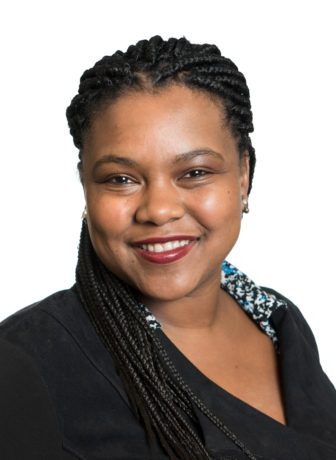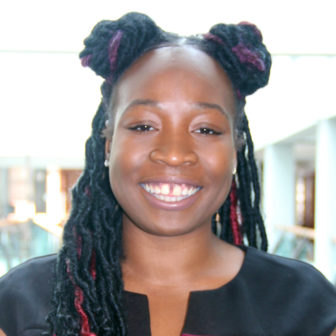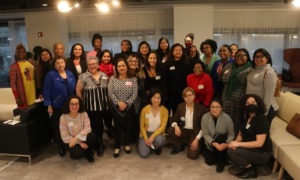
smolaw/Shutterstock
.
“Here I was figuring out how to connect to resources. I was helping opportunity youth but didn’t do that for myself. I’m on a national stage and at the local level and was still dealing with some of the same systems that they were while being poor. That was really hard to navigate, cope with and transcend.”
—Shawnice Jackson

Kisha Bird
In my role of leading national youth policy conversations, something has been bothering me. These last few years, it has become a thorn in my side. Convening after convening, I have been seeing more and more youth participation and there are more young people sharing their stories.
This is a good thing, but I keep thinking, “Are we helping or hurting young people in these spaces?” When I say we, I mean the collective “we,” program leaders, youth policy advocates, agency leads and funders.
As a lifelong youth development professional, I have always questioned how young people are treated in certain spaces and how organizations show up in partnership with them. Perhaps this is bothering me because I am getting older or maybe it’s because I see myself in many of the young people who also sit on these national stages alongside me.
But I am not asked to constantly share my personal story and challenges in adolescence and young adulthood. People just accept that I am an “expert.” I wonder, as youth transition from being a program participant to an organizational, local, state and/or national leader, how are we, the collective we, supporting them? Not only in their exposure — flying them from this meeting and convening to the next — but also supporting their financial, social and emotional needs and dreams, in the here and now and long term.
I spoke to Shawnice Jackson, a leader in the national opportunity youth movement and native of Baltimore, to help me think about these questions. A graduate of Public Allies, she shared some of her thoughts and experiences with me.
Q: Tell me about your experience at Public Allies. What about the program contributed to your success then and now?
A:
- The idea of continuous learning and professional development
- Intentional support related to individual and work goals
- Weekly trainings on topics that support advancement in nonprofit careers, such as developing logic models, crafting elevator speeches
- Access to professional relationships, building social capital, expanding networks
- Income is not an add-on.
She noted that Public Allies’ monthly allowance was higher than the standard AmeriCorps living allowance. At the time, the AmeriCorps living allowance was around $12,000 for a year of service (approximately $500 every two weeks). Public Allies participants received about $1,500 a month for 10 months of service.
From Participant to Leading A Movement
I asked Shawnice to speak to me about her transition from being a participant in a program to being on the national stage and leading a movement.

Shawnice Jackson
“It was really difficult. It reminded me of the Double Consciousness that W.E.B. DuBois spoke of in ‘The Souls of Black Folks’ over 100 years ago. I felt like I was constantly living in two worlds. I was consistently going back and forth between two different identities. I felt like I was working with opportunity youth while being branded as an opportunity youth. I was struggling with how I identified myself versus how others in the field perceived me.”
According to Hart’s Ladder of Children’s Participation, tokenism is “when young people appear to be given a voice, but in fact have little or no choice about what they do or how they participate.” We were constantly telling our stories, but we needed more support, including mental health spaces. She shared that since this kind of support was not there, they created these informal spaces for themselves.
Q: What has helped you on your leadership journey?
A: Building a supportive community through the Council. The National Council of Young Leaders (the Council) is Opportunity Youth United’s steering committee. Since 2012, they’ve represented opportunity youth in public gatherings all over the country. In addition, they have developed “Recommendations to Increase Opportunity and Decrease Poverty in America” and made decisive decisions regarding their organizational strategic direction and partnered with youth and anti-poverty organizations to advance policies and systemic solutions.
Q: What do we need to do differently?
A:
- Recognize where young people are in their leadership trajectory and where they are personally.
- Understand that many youth advocates, especially those that are former participants, are living paycheck to paycheck. Pay young people what they are worth. Invest into their professional development.
- At the most rudimentary level, ensure the most basic needs of young people are met and make sure young leaders aren’t in survival mode and have income for food, housing and transportation.
“Opportunity youth and former opportunity youth are still part of communities that are struggling,” Shawnice said. “Our families are struggling. We are struggling.”
Invest time in authentic relationships.
Shawnice shared a story with me about how one day, leaving an Aspen Forum for Community Solutions convening, one of the leaders in the movement sat with her and just asked how she was and what she wanted to do next: “I felt seen. If you don’t know who young people are at their core, you can’t help from an authentic space.”
In addition to what Shawnice shared, youth-focused organizations, public and private agencies, and policymakers should create intentional opportunities for former youth program participants through employment, fellowships and paid work experiences. Policy and direct service organizations alike should examine their human resource and hiring policies and develop career pathways into leadership positions.
I count it all joy to count Shawnice as part of my family and professional networks. I have learned so much from her over these past several years of being in partnership with the opportunity youth movement. Thank you, Shawnice, for taking time to share your journey and experiences with me and for your leadership in the field.
Kisha Bird is director of youth policy at the Center for Law and Social Policy and project director for the Campaign for Youth, a national coalition chaired by CLASP. Focusing on local and federal policy solutions, she works to expand access to education, employment and support services for low-income and opportunity youth, with a focus on young men and women of color.































